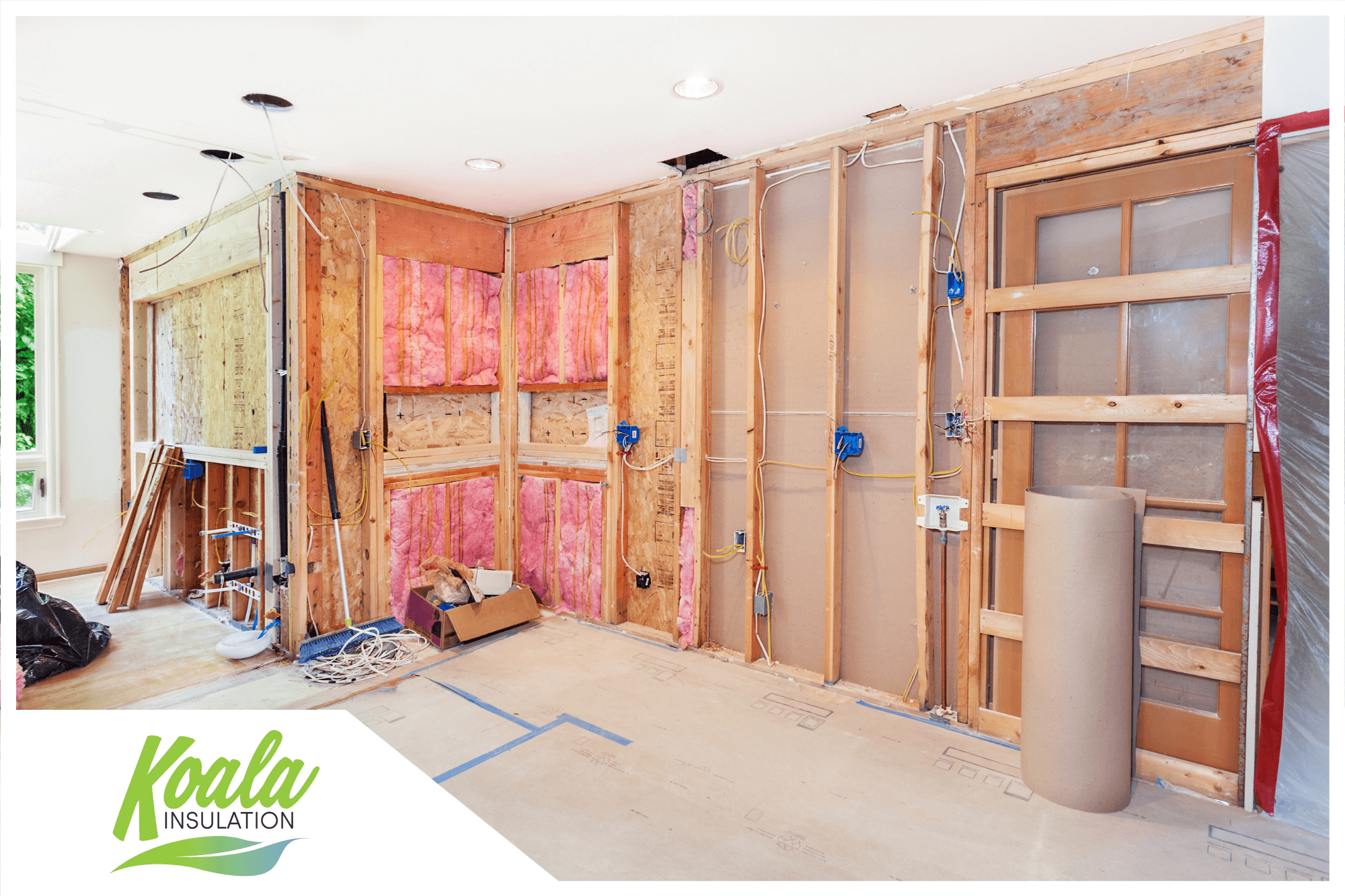Why You Should (Usually) Replace Insulation when Remodeling

There are many moving parts during a home improvement project. As you’re working, other tasks pop up and new ideas spring to mind. While it’s important to stay focused and stick to the plan in order to remain cost-effective and on schedule, this can present an opportunity to take care of several needs at once. One of the best advantages you can take while you’re improving your home is to look into the current condition of your insulation.
Evaluating your insulation during a remodel project gives you the chance to access older insulation, reduce health risks and hazards, and lower your energy costs. Especially if you’re in the middle of a major renovation, taking the chance to replace deteriorated insulation can increase the potential return on investment. Our experts at Koala Insulation have put together an explanation on how an insulation evaluation during your remodel can help you meet several goals in one job.
The Benefits of Insulation
Insulation is critical to improving your home’s climate control. The material slows heat transfer, which is the rate at which heat moves through a structure. Insulation is installed throughout the home, based on code requirements, your climate zone, and the specific needs of the house. The efficiency of the material is measured by its R-value, also known as resistance value; generally, a higher R-value means better resistance.
However, many homeowners aren’t aware of the additional benefits insulation provides to a house. Updated insulation acts as a vapor and moisture barrier, improves indoor air quality, and can even reduce noise between rooms, floors, and the outside. Most remodel efforts are to improve aesthetics, reduce costs, and improve the functionality of the home. Insulation can significantly contribute to these efforts, especially if the material has deteriorated and is already in need of removal and replacement.
Why You Should Reinsulate Your Home During a Remodel
Access to Older Insulation
If you’re already planning on repainting, taking down drywall, or repairing any damages on the building envelope, this is a great opportunity to gain access to hard-to-reach insulation. For example, when you need to retrofit insulation in the walls, there’s the potential need to remove drywall or a small piece of the wall in order to reach the material. When you’re already planning on repairing these spaces, there’s less concern about the impact of the existing structure when updating the insulation and air sealing.
When working in crawl spaces, the crevices of your attic, and around your wallboards, take the extra step to inspect the insulation in these spaces. While it’s possible for you to calculate the current R-value for materials like batts, it’s also necessary to look at the condition of the insulation. Check for signs of moisture, pests, and other damages or deflation. These are not only signs for you to remove and replace the material as soon as possible, but they can also reveal bigger problems like water damage, infestation, or significant air leaks.
Reduces Health Risks
Checking your insulation during a remodel is crucial to protecting you and your household from potential health risks and hazards. As mentioned earlier, when you or an insulation technician inspect the material, it’s necessary to look out for signs of moisture or pests. While many insulation materials can last up to 15 years, there are a number of variables that increase the rate of deterioration. Discovering water damage or pest nests can point you in the direction of larger problems such as leaks, structural damage, and infestation.
During your home renovation, it’s important to keep an eye out for previously hidden damages in areas that are typically considered “out of sight, out of mind.” Upgraded insulation and air sealing can significantly reduce these risks. For example, air sealing in your home prevents air leaks while also reducing the entrance of bacteria, allergens, and other outdoor pollutants. This also assists the vapor barrier created by insulation, which reduces incoming moisture and condensation from areas like your ceiling, floors, and exterior walls.
Reduces Energy Costs
Finally, you’re most likely taking the time to remodel in an effort to make positive return on investment choices. Whether it’s to increase your home’s value, improve the energy efficiency of the house, or reduce costs with upgraded products. With adequate coverage and properly installed insulation, you can significantly improve each of these aspects but it has the most significant impact on your energy costs.
When your home has deteriorated or poorly installed insulation, unwanted heat comes in during the summer and desired warmth escapes throughout the winter. As a result, your HVAC system has to work harder to keep up with the temperature on the thermostat. Not only does this drastically increase your heating and cooling bills but it can also lead to higher maintenance fees to repair your overworked unit. Insulation helps your home maintain climate control, temperature regulation, and indoor air quality which in turn lowers your HVAC needs and energy costs, even during extreme temperatures throughout the year.
Consult Local Industry Experts for Your Next Project
When you’re looking to make a change around the house, it can spiral into a number of new projects, remodel plans, and expectations. One of the most important things a homeowner on the verge of a home improvement overload can do is focus on realistic expectations and consolidate where possible. Remodeling is a great opportunity to take care of old, deteriorated, or damaged insulation.
At Koala Insulation, our local teams provide free evaluations to give you and your household a look at the current condition of your home’s insulation. The EPA estimates 90% of U.S. homes have poor insulation and air sealing, which contributes to discomfort, irregular temperatures, and high energy costs. With a breakdown of the status of the house’s material, you can plan a cost-effective and energy-efficient upgrade that prioritizes your home’s specific needs. Contact your local Koala Insulation team to learn more about insulation’s influence on home renovation projects and schedule your free evaluation.
Find Your Location


Get a quote


